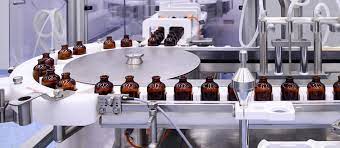Supplements manufacturers are companies that produce and market dietary supplements. These supplements can include vitamins, minerals, herbs, amino acids, and other ingredients that are intended to improve health and well-being. The industry has grown rapidly in recent years, and there are now thousands of supplement manufacturers around the world.
Manufacturers use a variety of methods to ensure the quality and purity of their supplements, including using high-quality raw materials, following Good Manufacturing Practices (GMPs), conducting laboratory testing, third-party testing and certification, quality control checks, and keeping records.
Manufacturers are required to comply with several regulations in the production of their products, including the Federal Food, Drug, and Cosmetic Act (FD&C Act), the Dietary Supplement Health and Education Act (DSHEA), Good Manufacturing Practices (GMPs), the Code of Federal Regulations (CFR) and international regulations.
When creating a new supplement product, manufacturers typically conduct extensive research on the ingredients and their potential health benefits, create a formulation, test the product, manufacture it, and conduct quality control checks. They also have to market and distribute the product to consumers.
It's important to note that manufacturers are responsible for ensuring that their products are safe and that the information on the labels is truthful and not misleading. They are also responsible for monitoring the safety of their products once they are on the market. Consumers should be aware of the quality of the supplement and the reputation of the manufacturer before purchasing a supplement product.
What is the process for creating a new supplement product?
The process for creating a new supplement product typically involves several key steps:
-
Research and Development: The first step in creating a new supplement is to conduct extensive research on the ingredients and their potential health benefits. This may involve reviewing scientific studies, consulting with experts in the field, and gathering feedback from potential customers.
-
Formulation: Once the research is complete, the manufacturer will create a formulation for the supplement. This involves determining the appropriate dosage levels and ratios of ingredients, as well as ensuring that the final product is stable and safe to consume.
-
Testing: The next step is to test the product to ensure that it meets quality and safety standards. This may involve conducting laboratory tests to measure purity, potency, and stability, as well as conducting clinical trials to test the effectiveness of the product.
-
Manufacture: Once the product has been formulated and tested, it is ready for manufacture. This typically involves processes such as mixing, encapsulation, and packaging.
-
Quality Control: Before releasing the product to the market, manufacturers must ensure that all quality control and safety standards have been met.
-
Marketing and Distribution: The final step is to market and distribute the product to consumers. This includes creating packaging and labeling, as well as promoting the product through various channels such as advertising, social media, and e-commerce.
How do manufacturers ensure the quality and purity of their supplements?
Manufacturers use a variety of methods to ensure the quality and purity of their supplements, including:
-
Using high-quality raw materials: Manufacturers source ingredients from reputable suppliers and use analytical testing to ensure that they meet purity and potency specifications.
-
Following Good Manufacturing Practices (GMPs): Manufacturers must follow GMPs, which are a set of guidelines and regulations that ensure products are consistently produced and controlled according to quality standards.
-
Conducting laboratory testing: Manufacturers use various analytical testing methods, such as high-performance liquid chromatography (HPLC) and inductively coupled plasma-mass spectrometry (ICP-MS), to ensure that ingredients are pure and that the finished product meets specifications for potency, purity, and stability.
-
Third-party testing and certification: Manufacturers may choose to have their products tested by independent third-party laboratories to ensure quality and purity. Some manufacturers also choose to have their products certified by organizations such as NSF International or the USP (United States Pharmacopeia).
-
Quality control checks: Manufacturers conduct regular quality control checks throughout the manufacturing process, including inspections of raw materials, in-process materials, and finished products.
-
Keeping records: Manufacturers must maintain detailed records to demonstrate compliance with GMP regulations and to assist in the identification of any issues that may arise.
It's important to note that some countries and regions have their own regulations and guidelines for supplement manufacturing, and manufacturers are required to comply with these regulations.
What regulations do manufacturers need to comply with in the production of supplements?
Manufacturers of dietary supplements are required to comply with several regulations in the production of their products. The main regulations include:
-
The Federal Food, Drug, and Cosmetic Act (FD&C Act): This act defines dietary supplements and sets out the regulations for their manufacture, labeling, and marketing.
-
The Dietary Supplement Health and Education Act (DSHEA): This law defines the terms "dietary supplement" and "nutritional supplement," and establishes guidelines for the safety and labeling of dietary supplements.
-
Good Manufacturing Practices (GMPs): These regulations set out guidelines for the production, packaging, and storage of dietary supplements to ensure product quality and safety.
-
The Code of Federal Regulations (CFR): The CFR contains the specific regulations that manufacturers must follow, including those related to labeling, packaging, and product testing.
-
International regulations: Some manufacturers also have to comply with regulations from other countries and regions, such as the European Food Safety Authority (EFSA) and the Food Standards Australia New Zealand (FSANZ)
It's important to note that manufacturers are responsible for ensuring that their products are safe and that the information on the labels is truthful and not misleading. They are also responsible for monitoring the safety of their products once they are on the market. In case of any serious adverse event, the manufacturer or distributor are required to notify the FDA promptly.
How do manufacturers determine appropriate dosages for their supplements?
Manufacturers determine appropriate dosages for their supplements by considering a variety of factors, including:
-
Recommended Daily Allowances (RDAs) or Dietary Reference Intakes (DRIs): These are guidelines established by government agencies and expert panels that provide recommended daily nutrient intake levels for different age groups and genders.
-
Clinical studies: Manufacturers may consult the results of clinical studies, which can provide information on the optimal dosages of specific ingredients.
-
Expert opinions: Manufacturers may consult with experts in the field, such as nutritionists, dietitians, or medical doctors to determine appropriate dosages.
-
Traditional use: Manufacturers may consider the traditional use of an ingredient in a certain culture or population, and use that information to determine appropriate dosage levels.
-
Safety: Manufacturers must consider the safety of the ingredients and the dosage levels, and ensure that the product does not exceed the Tolerable Upper Intake Level (UL) for any nutrient.
It's important to note that manufacturers are not allowed to make therapeutic claims for their products, and they are only allowed to list the dose of the ingredients on the label. Also, the FDA does not review or approve dietary supplement products before they are marketed. However, manufacturers must ensure that their products are safe and that the information on the labels is truthful and not misleading.
How do manufacturers choose which ingredients to include in their supplements?
Manufacturers choose which ingredients to include in their supplements by considering a variety of factors, including:
-
Scientific research: Manufacturers review scientific studies to determine the potential health benefits and safety of different ingredients.
-
Customer demand: Manufacturers may consider the popularity and demand for certain ingredients among consumers when formulating their products.
-
Quality and purity of ingredients: Manufacturers source ingredients from reputable suppliers and use analytical testing to ensure that they meet purity and potency specifications.
-
Cost-effectiveness: Manufacturers consider the cost of ingredients and how they will impact the overall cost of the product.
-
Synergy: Manufacturers may choose ingredients that work together synergistically, to enhance the effectiveness of the supplement.
-
Manufacturing process: Manufacturers may also choose ingredients that are easy to use and incorporate into the manufacturing process.
It's important to note that manufacturers are required to list all the ingredients on the product label, and they are not allowed to make false or misleading claims about the ingredients or their effects. Also, the FDA does not review or approve dietary supplement products before they are marketed, and it's the manufacturers' responsibility to ensure that their products are safe and the information on the labels is truthful and not misleading.
How do manufacturers determine the shelf life of their supplements?
Manufacturers determine the shelf life of their supplements by conducting stability testing. The stability testing can be used to predict the shelf life of the product.
-
Accelerated testing: Manufacturers conduct testing on the product by exposing it to various environmental conditions, such as high temperatures and humidity, to simulate the effects of long-term storage.
-
Real-time testing: Manufacturers store the product under normal conditions for an extended period of time to determine the shelf life under real-world conditions.
-
Analytical testing: Manufacturers may conduct analytical testing, such as HPLC and ICP-MS, to monitor the potency, purity and stability of the product over time.
-
Microbial testing: Manufacturers may also test the product for the presence of microorganisms that can cause spoilage, such as bacteria and mold.
Based on the results of the stability testing, manufacturers can determine the appropriate shelf life for their product. They are required to include the expiration date on the product label, and they must also indicate the storage condition (e.g. "store in a cool, dry place").
It's important to note that manufacturers are responsible for ensuring that their products are safe and that the information on the labels is truthful and not misleading, even after the expiration date.


